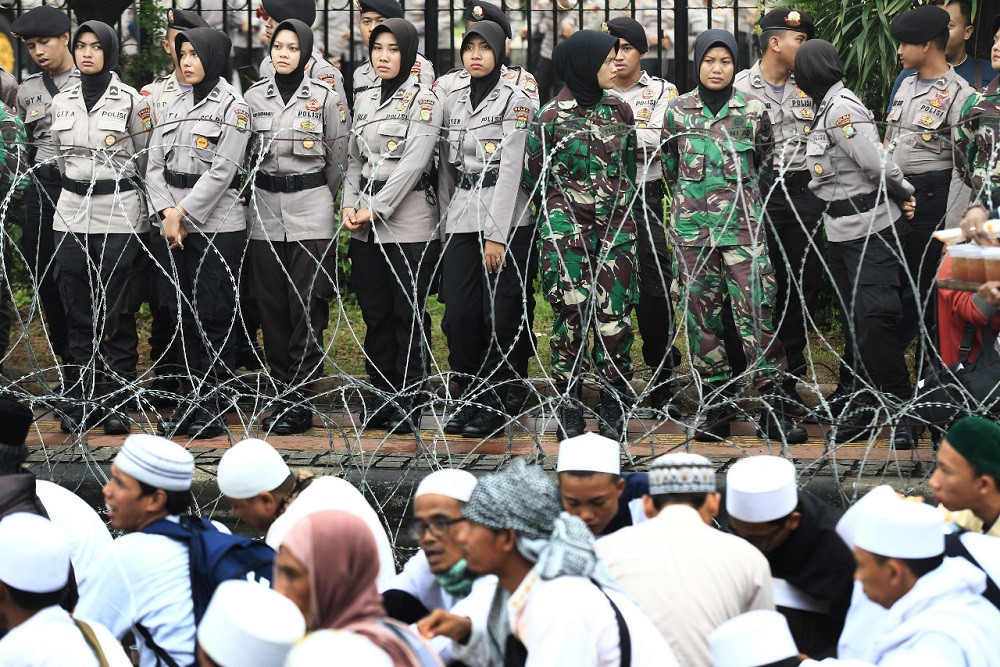The FPI and Betawi people: Our urban poor problem
The newly banned Islam Defenders Front (FPI), an Islamic organization known for its tendency to commit acts of violence, provided Betawi people with ideological legitimacy to ransack alcoholic beverage sales, prostitution and other sinful acts according to Islamic teachings.
Change Size

F
rankly speaking, our knowledge of urban lives and their physical surroundings is often more superficial rather than profound. Among skyscrapers and other symbols of modernity and progress in Jakarta, the existence of Betawi people, natives of Jakarta, for instance, remained unrecognized until some of them embraced a new kind of radicalism.
The newly banned Islam Defenders Front (FPI), an Islamic organization known for its tendency to commit acts of violence, provided Betawi people with ideological legitimacy to ransack alcoholic beverage sales, prostitution and other sinful acts according to Islamic teachings.
Consequently, Betawi people in the FPI not only sent a stern message to non-Muslims that they were going to create an Islamic state by implying sharia but also ironically positioned themselves as the common enemy of the majority of Jakarta inhabitants. Actually, like most good religious people, non-Muslims in Jakarta are quite happy with the FPI’s conservative stance against such sinful acts.
It is well understood that regardless of their beliefs, religious people share the common view that the consumption of alcoholic beverages, prostitution and gambling are satanic acts that should be perished, if not limited at all. But their bad habit of committing violence gives outsiders a picture that they desire more than eradicating such sinful acts.
Betawi people – once known for their vast land ownership – are among those who lose the game in modern – Darwinian – capitalistic Jakarta. Regeneration of these people takes place but then fails to produce a stronger, richer, more educated and more competitive new generation. The Betawi people, who were the majority inhabitants of Jakarta up until the 1940s, then slowly became the marginalized minority as urbanization began in the 1950s.
Si Doel Anak Betawi (Doel Son of Betawi), a popular 1990s TV series, shows how far Betawi people had fallen behind newcomers in Jakarta. They slowly had declined from generations of land owners (their great-great grandfathers) and farmers, to generations of oplet (public minivan) drivers and now ojek (motorcycle taxi) riders. From this point we absolutely can take note that the unemployment rate among Betawi people in their productive age is quite high.
In Tanah Abang district, from generation to generation, Betawi people silently inherited the oplet driver-ojek rider profession without making any complaints, until a local charismatic cleric calling himself habib founded in 1998 the FPI, a mass organization that promoted a set of religious views. In Islamic Betawi tradition, habib is a cleric with special genealogical status: a descendant of Prophet Muhammad.
In Tanah Abang, the habib, Rizieq Shihab, spread conservative Islam, with special emphasis on the right to infringe violent actions against those believed to have attacked their religion and well-being.
The duet between the alienated Betawi people and the habib with his uncompromising interpretation of religious views soon discovered that both could create something that may force others to reckon with: the superior power of a militant minority upon a moderate majority.
Since the authoritarian president Soeharto stepped down and the rise of ethnically and religiously based mass movements in 1998, Betawi people in the FPI learned that militancy and violence were good instruments to make their existence visible.
Up to this point, it is interesting to compare and contrast the roles being played by two well-known clerics in Jakarta: the militant, firebrand Rizieq and the moderate, soft-spoken Munzir al- Musawwa.
Munzir does not speak on the formation of an Islamic state in Indonesia. But he has driven thousands of Betawi youths and created the most hated traffic congestion during mass prayers where he used to give sermons.
The main attraction of Munzir is neither his sermon nor his personality. It is the demonstration of youths who “occupy” half or a whole street temporarily for their own, showing that --whether others like it or not – the Betawi followers of Munzir exist. Although the Betawi followers of Munzir and Rizieq are different, both are the same in making sure that their existence is visible in Jakarta.
Many tend to perceive the problem with the FPI as ideological, part of the everlasting battle between radical and moderate Muslims, or conservative Muslims and liberal-secularists. Very often people fail to see the militant-violence loving FPI as an urban syndrome and the key to solving the problem lies in the social recognition of the Betawi people. If this case is more sociological rather than political, we, regardless of our ideology orientation, share the same responsibility to overcome this social-urban problem.
It is important to notice that, with the strong Nahdlatul Ulama (NU) traditions among FPI’s Betawi members, there has been no inclination to commit acts of terror. It is very “uncultural” and out of context if we then jump to the conclusion that they are terrorists, and therefore justify a crackdown on them. Unlike other NU followers who embrace moderate views, these FPI Betawi members are critical of the current “nationalist” government.
Unless we have more sound arguments – rather than negative ideological sentiments— and sufficient evidence, it is far too reckless to brand these people as terrorists. Otherwise, we have to admit that our knowledge of urban life is often more superficial rather than profound.
***
The writer is a senior journalist, living in Jakarta.









